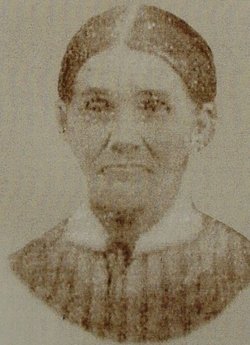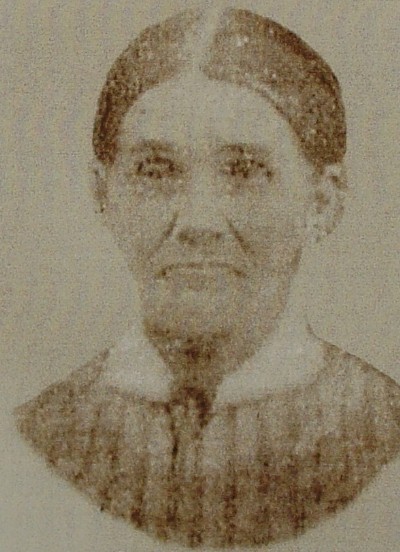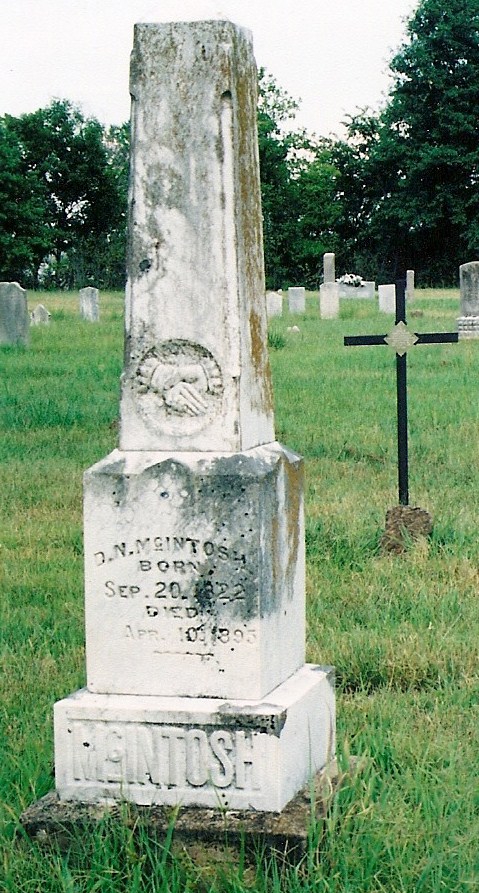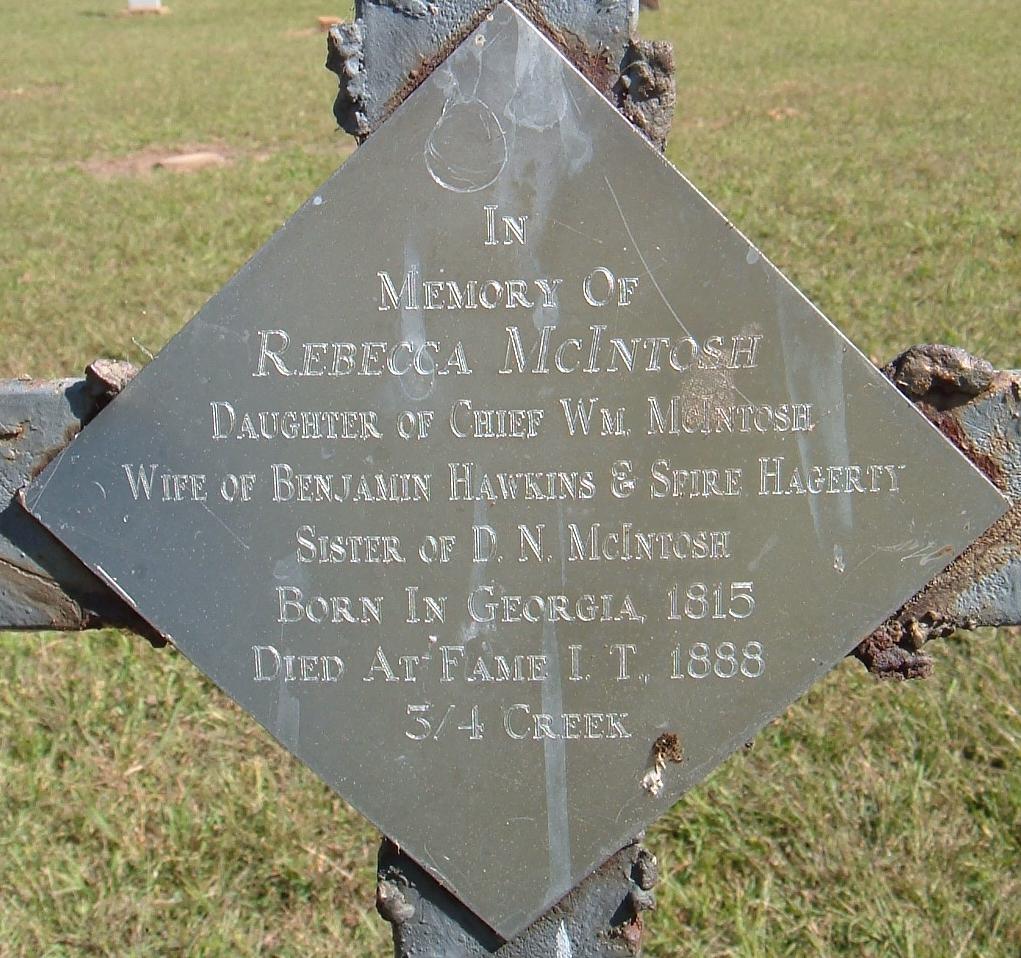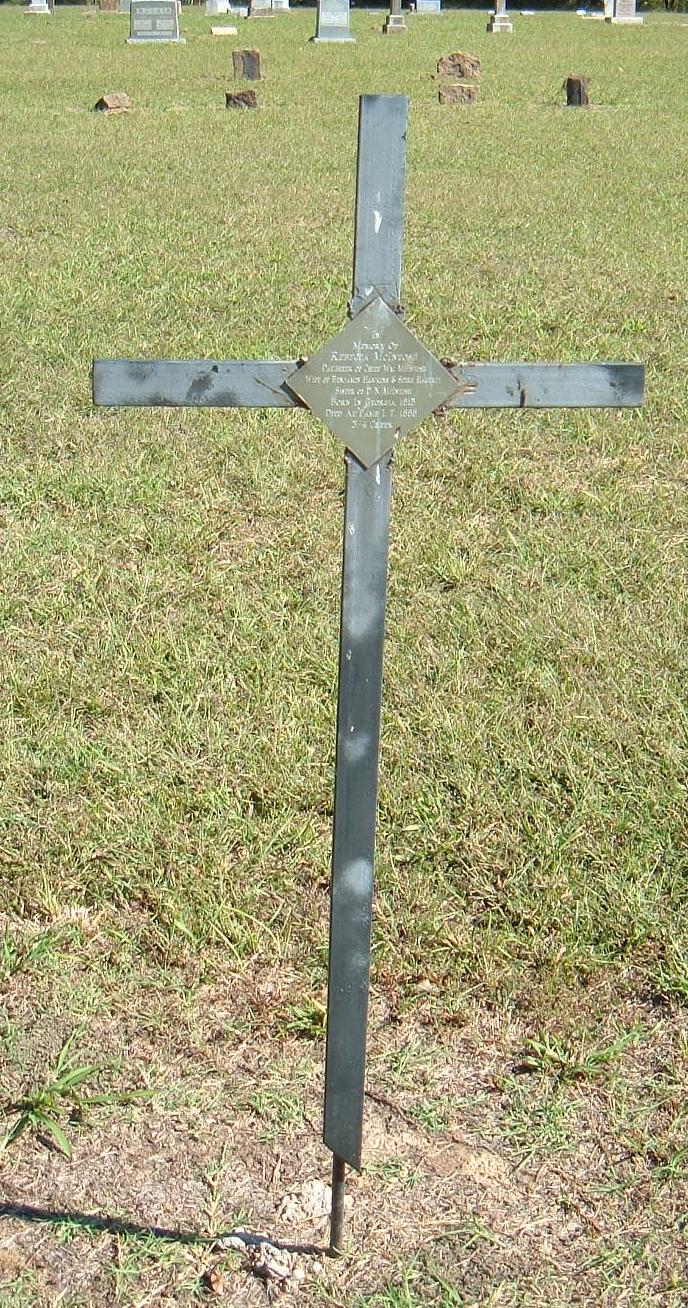After McIntosh was murdered by his tribesmen in 1825 for unauthorized cessions of Indian lands, the family and their slaves joined the forced migration of the Georgia Creeks to the part of Arkansas Territory that is now in Oklahoma. They settled near Fort Gibson, where in 1831 Rebecca married Benjamin Hawkins, an educated, mixed-blood Creek and sometime business partner of Sam Houston.
Late in 1833 the couple moved to Texas and settled near Nacogdoches. Three years later Hawkins was murdered, apparently for conspiring with Houston to introduce a large Creek settlement into Texas.
Left a young widow with two small daughters, Rebecca Hawkins began to purchase land and slaves. In 1838 she married Spire M. Hagerty, a planter who owned a large estate near Marshall, in the area that later became Harrison County. The marriage, which produced another daughter and a son, was unhappy, and the couple separated frequently. Rebecca filed a petition for divorce, but her husband's death in December 1849 released her from the union while the proceedings were still underway.
Beginning in the late 1840s Hagerty, through purchases and lawsuits, acquired control of slaves and land sufficient to make her one of the richest planters in antebellum Texas. In her capacity as guardian for the children of her first marriage, she purchased jointly with her sister's husband a 3,000-acre plantation near Jefferson, to which she moved her family. Two years later, in 1851, she bought out her brother-in-law's half and with the assistance of her eldest daughter's husband took over the entire management of the plantation.
Her husband's death had given her the opportunity to contend for control of the Harrison County plantation as well. She instituted a series of lawsuits to challenge his disposition of the estate, with the result that the property was ultimately divided between their son and daughter. As the children's legal guardian she assumed legal and practical control of the plantation, and in less than a decade she tripled its operating profit.
Census reports show that in 1860 Rebecca Hagerty was the only woman in Texas who owned more than 100 slaves. As one of the largest cotton planters in both Marion and Harrison counties, she produced between 500 and 600 bales annually for the New Orleans market.
After the Civil War reduced her plantations to a fraction of their former value, Hagerty and her two younger children entered into a business with a Jefferson merchant that apparently was not a success. She continued to maintain close ties with her relatives in the western Creek Nation, where her uncle and brothers had for years been prominent in tribal government. She died during a visit to the Creek Nation in about 1877 and was buried in Checotah, in what is now McIntosh County, Oklahoma."
BIBLIOGRAPHY: Rebecca M. H. Hagerty Papers, Dolph Briscoe Center for American History, University of Texas at Austin. Judith N. McArthur, "Myth, Reality, and Anomaly: The Complex World of Rebecca Hagerty," East Texas Historical Journal 24 (Fall 1986). John Bartlett Meserve, "The MacIntoshes," Chronicles of Oklahoma 10 (September 1932).
After McIntosh was murdered by his tribesmen in 1825 for unauthorized cessions of Indian lands, the family and their slaves joined the forced migration of the Georgia Creeks to the part of Arkansas Territory that is now in Oklahoma. They settled near Fort Gibson, where in 1831 Rebecca married Benjamin Hawkins, an educated, mixed-blood Creek and sometime business partner of Sam Houston.
Late in 1833 the couple moved to Texas and settled near Nacogdoches. Three years later Hawkins was murdered, apparently for conspiring with Houston to introduce a large Creek settlement into Texas.
Left a young widow with two small daughters, Rebecca Hawkins began to purchase land and slaves. In 1838 she married Spire M. Hagerty, a planter who owned a large estate near Marshall, in the area that later became Harrison County. The marriage, which produced another daughter and a son, was unhappy, and the couple separated frequently. Rebecca filed a petition for divorce, but her husband's death in December 1849 released her from the union while the proceedings were still underway.
Beginning in the late 1840s Hagerty, through purchases and lawsuits, acquired control of slaves and land sufficient to make her one of the richest planters in antebellum Texas. In her capacity as guardian for the children of her first marriage, she purchased jointly with her sister's husband a 3,000-acre plantation near Jefferson, to which she moved her family. Two years later, in 1851, she bought out her brother-in-law's half and with the assistance of her eldest daughter's husband took over the entire management of the plantation.
Her husband's death had given her the opportunity to contend for control of the Harrison County plantation as well. She instituted a series of lawsuits to challenge his disposition of the estate, with the result that the property was ultimately divided between their son and daughter. As the children's legal guardian she assumed legal and practical control of the plantation, and in less than a decade she tripled its operating profit.
Census reports show that in 1860 Rebecca Hagerty was the only woman in Texas who owned more than 100 slaves. As one of the largest cotton planters in both Marion and Harrison counties, she produced between 500 and 600 bales annually for the New Orleans market.
After the Civil War reduced her plantations to a fraction of their former value, Hagerty and her two younger children entered into a business with a Jefferson merchant that apparently was not a success. She continued to maintain close ties with her relatives in the western Creek Nation, where her uncle and brothers had for years been prominent in tribal government. She died during a visit to the Creek Nation in about 1877 and was buried in Checotah, in what is now McIntosh County, Oklahoma."
BIBLIOGRAPHY: Rebecca M. H. Hagerty Papers, Dolph Briscoe Center for American History, University of Texas at Austin. Judith N. McArthur, "Myth, Reality, and Anomaly: The Complex World of Rebecca Hagerty," East Texas Historical Journal 24 (Fall 1986). John Bartlett Meserve, "The MacIntoshes," Chronicles of Oklahoma 10 (September 1932).
Family Members
-
![]()
Jane Ahkohkee McIntosh Hawkins-Carr
1801 – unknown
-
![]()
COL William Chillicothe "Chilly" McIntosh
1804–1875
-
![]()
Catherine "Kate" McIntosh Cousins
1809–1849
-
![]()
Delilah McIntosh Drew
1818–1885
-
Sarah "Sallie" McIntosh McLish
1820–1903
-
Hettie Catherine McIntosh Willison
1820–1887
-
![]()
Col Daniel Newnan "Noonin" McIntosh
1822–1895
Advertisement
Advertisement
